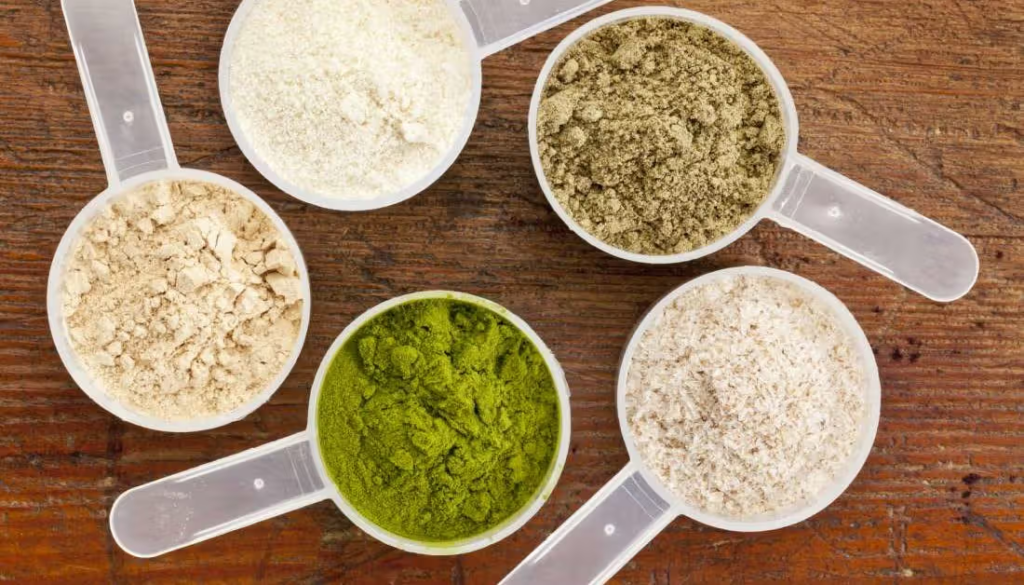Pregnancy is an exciting journey filled with questions about what’s best for your baby and your body. One common query among expecting mothers is whether protein powders are safe during pregnancy. With nutrition playing a crucial role in supporting both you and your growing baby, it’s essential to understand the role of protein and how supplements like protein powders fit into the picture. Let’s dive in!
Table of Contents
Introduction
During pregnancy, your body undergoes remarkable changes, and nutrition becomes more critical than ever. Among the essential nutrients, protein stands out as a building block for life, playing a vital role in the development of your baby and your overall well-being. While food is the best source of nutrients, protein powders can sometimes help fill the gap. But are they safe during pregnancy? Here’s what you need to know.

Why Protein is Essential During Pregnancy
Protein’s Role in Fetal Growth
Protein is indispensable for the formation of tissues, organs, and cells in your baby. It aids in the development of muscles, bones, skin, and even hormones. In the later stages of pregnancy, protein requirements increase to support rapid fetal growth and the formation of the placenta.

Protein’s Benefits for the Mother
Beyond benefiting the baby, protein is vital for you too. It helps strengthen maternal tissues, including the uterus and breasts, which are adapting to pregnancy. Protein also supports increased blood supply and boosts energy levels, keeping you active and resilient throughout this transformative journey.
How Much Protein Do Pregnant Women Need?
Recommended Daily Allowance (RDA)
The recommended protein intake for pregnant women varies by trimester. In the first trimester, 46 grams per day is often sufficient, but by the third trimester, this requirement increases to around 71 grams. This increase reflects your baby’s accelerated growth and your body’s greater demands.
Sources of Protein
Protein can be obtained from a variety of sources. Natural options like eggs, fish, lean meats, dairy, beans, and tofu are excellent choices. However, for women struggling to meet their protein needs through food alone, supplements like protein powders may be helpful.
Are Protein Powders Safe for Pregnancy?

Evaluating Safety
Protein powders can be safe during pregnancy if chosen carefully. Always check the ingredient list for any additives, artificial sweeteners, or unverified herbs. Look for powders specifically labeled as safe for pregnancy or designed for maternal nutrition.
Potential Risks of Certain Protein Powders
Not all protein powders are created equal. Some may contain heavy metals, artificial flavours, or fillers that could harm you or your baby. Always opt for third-party tested products with minimal ingredients, avoiding anything with hidden chemicals or non-organic certifications.
Choosing the Right Protein Powder for Pregnancy
Types of Protein Powders
There are several types of protein powders to consider:
- Whey protein: Derived from milk, rich in essential amino acids, and easily absorbed.
- Plant-based protein: A great option for vegans, with sources like pea, hemp, or rice protein.
- Collagen protein: Focused on skin, hair, and joint health, though it’s less comprehensive nutritionally.
Factors to Consider
When shopping for a protein powder during pregnancy, prioritize quality over convenience. Choose reputable brands with certifications for safety, avoid powders with excessive sugars or additives, and consider allergen-friendly options if needed.
Alternatives to Protein Powders
Natural High-Protein Foods
Whole foods are always the best option. Some natural, protein-rich choices include:
- Eggs: A complete protein source.
- Nuts and seeds: Perfect for snacks or salads.
- Legumes: Such as lentils and chickpeas.
- Greek yogurt: High in protein and calcium.
Simple Protein-Rich Recipes for Pregnant Women
Here are a few easy recipes to boost your protein intake:
- Smoothie: Blend spinach, almond butter, a banana, and a scoop of protein powder (if approved).
- Salad: Add grilled chicken, quinoa, and avocado for a filling lunch.
- Snacks: Try hummus with veggie sticks or hard-boiled eggs.
How to Incorporate Protein Powders Safely During Pregnancy

Tips for Moderation
Moderation is the cornerstone of incorporating protein powders safely during pregnancy. While protein is essential, consuming excessive amounts can put unnecessary strain on the kidneys or lead to nutritional imbalances. Here are some practical tips:
- Stick to recommended portions: Most protein powders suggest a serving size of one scoop (20–30 grams of protein). Always adhere to these guidelines unless advised otherwise by your healthcare provider.
- Avoid excessive protein: Pregnant women typically need 70–100 grams of protein daily, depending on the trimester. If you’re already eating high-protein foods, one protein shake a day may be enough.
- Timing matters: Consuming protein powder as a snack or part of a meal can help stabilize your blood sugar levels and keep you energized. Avoid relying on shakes as meal replacements—they’re best used as supplements, not substitutes.
Combining Protein Powders with a Balanced Diet
A protein shake alone won’t meet all your nutritional needs. The key is to pair protein powders with a variety of whole foods:
- Add fruits and vegetables: Blend your protein powder with spinach, berries, or bananas to pack in fiber, vitamins, and antioxidants.
- Incorporate healthy fats: Mix in a spoonful of almond butter, chia seeds, or avocado for added omega-3s.
- Pair with whole grains: Pair your shake with a slice of whole-grain toast or oatmeal to create a balanced meal.
This combination ensures optimal nutrient absorption and supports your baby’s development.
Common Myths About Protein Powder and Pregnancy
Myth: All Protein Powders Are Dangerous
Not all protein powders are harmful during pregnancy. High-quality powders from reputable brands can be a safe addition to your diet. Misconceptions often arise from low-quality products that contain harmful additives like artificial sweeteners or heavy metals. To clarify:
- Look for certifications: Third-party testing or organic certifications can confirm a product’s safety.
- Read the label: Avoid powders with unrecognizable or unnecessary ingredients.
By making informed choices, you can safely incorporate protein powders into your pregnancy diet.
Myth: Pregnant Women Need Huge Amounts of Protein
It’s true that pregnancy increases your protein requirements, but that doesn’t mean you need to double or triple your intake. Overloading on protein can cause digestive discomfort and reduce your appetite for other vital nutrients.
- Balance is key: Aim for a varied diet that includes protein from multiple sources.
- Trimester-specific needs: In the first trimester, your protein needs might be close to your pre-pregnancy levels. By the third trimester, they increase to support your growing baby.
Focus on quality over quantity, ensuring your diet is nutrient-rich and well-rounded.
When to Consult a Healthcare Provider
Recognizing Warning Signs
While protein powders are generally safe when used correctly, it’s essential to stay vigilant for any adverse effects, such as:
- Digestive issues: Bloating, diarrhea, or nausea may indicate that a particular protein powder isn’t right for you.
- Allergic reactions: Symptoms like itching, swelling, or difficulty breathing could point to an allergy.
- Weight gain or imbalance: Over-relying on protein powders might lead to excessive calorie intake.
If you notice any of these signs, stop using the protein powder immediately and consult a healthcare provider.
Seeking Professional Advice
Before adding protein powder to your diet, it’s always a good idea to consult your obstetrician or a registered dietitian. They can:
- Provide personalized recommendations: Tailor your diet to your specific needs and health conditions.
- Review product labels: Help you identify safe and effective protein powders.
- Address concerns: Offer guidance if you’re unsure about a product’s ingredients or its potential effects.
Professional advice ensures your dietary choices align with your pregnancy goals.
Real-Life Experiences
Every pregnancy is unique, and hearing from other mothers can provide reassurance and insights. Some women have found protein powders invaluable, especially during busy mornings or when battling nausea.
- Testimonial 1: “During my second trimester, I struggled to eat large meals. Adding a simple protein shake with almond milk kept my energy levels up.”
- Testimonial 2: “I opted for an organic, plant-based protein powder because I’m vegan. It helped me meet my nutritional needs without compromising my dietary preferences.”
These stories highlight how protein powders can be a convenient, safe supplement when used thoughtfully.
FAQs About Protein Powder and Pregnancy
1. Can I take protein powder in the first trimester?
Yes, but focus on obtaining most of your nutrients from whole foods. If you experience morning sickness and struggle with food intake, a clean, high-quality protein powder can help fill the gap.
2. What is the best type of protein powder for pregnancy?
Choose options like whey or plant-based protein powders that are free from artificial additives, heavy metals, and unverified ingredients. Look for organic or third-party certified brands.
3. Are there side effects of protein powders for pregnant women?
Potential side effects include digestive discomfort or allergic reactions, especially if the product contains allergens or additives. Stick to trusted brands and monitor your body’s response.
4. Do I need protein supplements if I eat a healthy diet?
Not necessarily. A well-balanced diet rich in natural protein sources should suffice. Supplements are most useful if you have difficulty meeting protein requirements due to dietary restrictions or pregnancy-related symptoms.
5. How do I avoid harmful ingredients in protein powders?
Carefully read ingredient lists and avoid powders with artificial sweeteners, high sugar content, or unverified additives. Choose reputable brands that disclose their ingredient sourcing and testing practices.
Conclusion
Protein is a crucial nutrient during pregnancy, supporting both your health and your baby’s development. While protein powders can be a helpful supplement, they’re not a one-size-fits-all solution. Choosing high-quality products, consuming them in moderation, and maintaining a balanced diet are key to making the most of this convenient option. Always consult your healthcare provider for personalized advice, ensuring your dietary choices are safe and effective.



MOST COMMENTED
Animal-Based Proteins / Casein Protein / Dietary Protein / High-Protein Diets / Pea Protein / Plant-Based Proteins / Protein / Protein Deficiency / Protein Supplements / Proteins / Whey Protein / Whey Proteins
Is Protein Powder Safe for Teenagers and Children?
Animal-Based Proteins / Casein Protein / Dietary Protein / High-Protein Diets / Pea Protein / Plant-Based Proteins / Protein / Protein Deficiency / Protein Supplements / Proteins / Whey Protein / Whey Proteins
Unlock the Power of Proteins for Optimal Gut Health
Multivitamin
Total Health: Multivitamin for Active Lifestyles
Multivitamin
WellnessFusion: Complete Multivitamin Support
Dietary Supplement
Revitalize Your Health: The Magic of Red Yeast Rice Capsules
Foot care / Foot Health
Revitalize Your Foot Care Routine: Essential Tips for Optimal Foot Health
Foot Problem / Diabetics / Foot Health
Diabetics: Mastering Footwear Selection for Enhanced Foot Health and Ultimate Comfort
Exercises and Footwear Tips for Hammertoe Relief / Foot care / Foot Health / Foot Pain / Foot Problem / Hammertoes
Unlock Effective Exercises and Footwear Tips for Hammertoe Relief
Hammertoes / Foot Health / Foot Pain / Foot Problem
Unlock Relief: Essential Guide to Hammertoes Causes, Symptoms, and Treatments
Foot Problem / Foot Health
Revolutionize Your Recovery: Natural Remedies for Plantar Fasciitis – Fresh Home Keepers